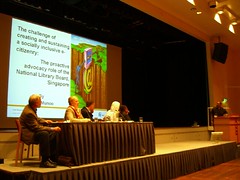Speaker from Iran talked about the digitisation work of her organisation (the Management and Planning Organisation of Iran. Shared some challenges faced in the digitisation work. They are moving towards a "full digital library".
The one from the Carribeans spoke about e-government initiatives in the Carribeans (btw, I learnt that the Carribeans is made up of 15 countries).
US speaker introduced the work of the Government Printing Office (GPO), one of which was a project to start a registry of u.s. Government digitisation projects (I think Singapore ought to start something like this too). I learnt there was a "science.gov" proj (www.science.gov). It's a cross-agency gateway to selected U.S. government science & tech information. This gateway allows deep web-searching in to database records that would otherwise not be retrieved by search engines. Challenges faced included the wide scope & breath of audience -- which then affected taxonomy issues.
My colleague shared NLB's experience in being involved in the e-government initiatives (e.g. Information Literacy programmes). There was an overview of the Singpaore government's e-govt timeline, and what role the NLB played in supporting the national IT strategy.

That's my colleague, Rajen, on the extreme right of the picture at the lecturn.
Last speaker talked about the challenges of a networked society. Mentioned that existing (institutional) structures of searching and presenting information are not evolving fast enough vis-a-vis globalisation, leading to "disintermediation" - i.e. libraries are bypassed for google. Suggests that as libraries put their collection online, they must also make available assistance online. Mentioned Govtinfo.org (GIO) and explained a framework of sorts called "EULEGIS".
Take-aways from the session:
Seems all governments in the world are moving towards "e-government". It might be easier to count the number of governments not doing so. The Internet is definitely firmly entrenched in government and society but a fully networked society cannot evolve by chance.
Effective e-government initiatives must include a national strategy for making its citizens "IT literate" and "Information Literate". That's might therefore be a key role for libraries to play, particularly public libraries.
BTW, as a response to a question during Q&A, the Carribean speaker made reference to a New South Wales study on the role of Public Libraries & E-government. Got to check up on that study.
Tag: IFLA, oslo 2005, role of libraries

No comments:
Post a Comment
Join the conversation. Leave a comment :)
Note: only a member of this blog may post a comment.